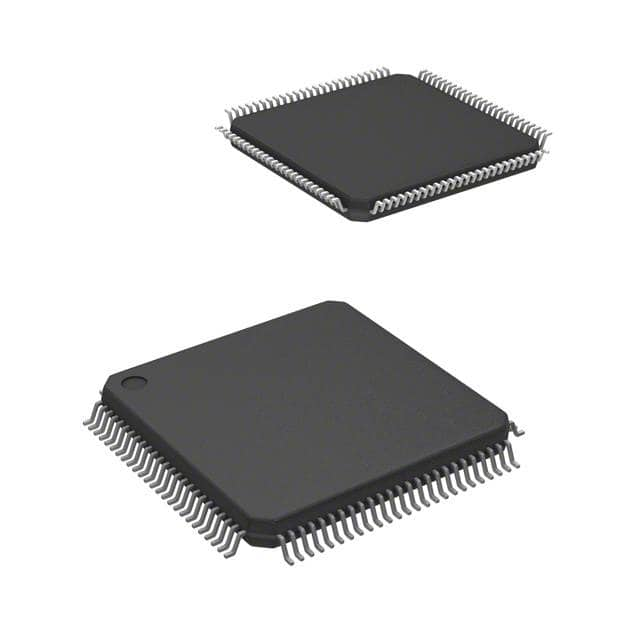TMS320BC52PZ57
Overview
Product Category
TMS320BC52PZ57 belongs to the category of digital signal processors (DSPs).
Use
This product is primarily used for processing and manipulating digital signals in various applications such as telecommunications, audio and video processing, industrial control systems, and automotive electronics.
Characteristics
- High-performance DSP with advanced features
- Low power consumption
- Efficient real-time signal processing capabilities
- Integrated peripherals for enhanced functionality
- Flexible programming options
Package
TMS320BC52PZ57 is available in a compact and durable package, ensuring easy integration into electronic systems. The package type is typically a plastic ball grid array (BGA).
Essence
The essence of TMS320BC52PZ57 lies in its ability to efficiently process digital signals in real-time, enabling complex algorithms and computations to be performed accurately and rapidly.
Packaging/Quantity
This product is usually packaged in reels or trays, depending on the manufacturer's specifications. The quantity per package may vary, but it is commonly available in quantities of 100 or more.
Specifications
- Architecture: Harvard
- Clock Speed: Up to 200 MHz
- Instruction Set: Modified Harvard
- Data Bus Width: 32-bit
- Program Memory Size: Up to 512 KB
- Data Memory Size: Up to 64 KB
- Operating Voltage: 3.3V
- I/O Pins: Varies based on specific model
- On-chip Peripherals: UART, SPI, I2C, GPIO, etc.
- Operating Temperature Range: -40°C to +85°C
Detailed Pin Configuration
The pin configuration of TMS320BC52PZ57 varies based on the specific model and package type. Please refer to the datasheet provided by the manufacturer for detailed pin assignments and functions.
Functional Features
- High-speed arithmetic and logic unit (ALU) for efficient computation
- Multiple on-chip peripherals for seamless integration with external devices
- Advanced interrupt handling mechanism for real-time responsiveness
- Integrated memory management unit (MMU) for efficient memory access
- Enhanced digital signal processing instructions for optimized performance
Advantages and Disadvantages
Advantages
- High-performance DSP capabilities
- Low power consumption
- Flexible programming options
- Integrated peripherals for enhanced functionality
- Efficient real-time signal processing capabilities
Disadvantages
- Limited availability of alternative models from different manufacturers
- Higher cost compared to general-purpose microcontrollers
Working Principles
TMS320BC52PZ57 operates based on the Harvard architecture, which separates program and data memory. It utilizes a modified Harvard instruction set, allowing simultaneous fetching of instructions and data. The processor executes instructions in parallel, enabling high-speed signal processing.
The working principle involves fetching instructions from program memory, decoding them, and executing the corresponding operations. The ALU performs arithmetic and logical operations on the data, while the integrated peripherals facilitate communication with external devices.
Detailed Application Field Plans
TMS320BC52PZ57 finds applications in various fields, including:
- Telecommunications: Signal processing in wireless communication systems, base stations, and network infrastructure.
- Audio and Video Processing: Real-time audio and video encoding/decoding, multimedia streaming, and digital media players.
- Industrial Control Systems: Process control, automation, robotics, and monitoring systems.
- Automotive Electronics: Engine control units, infotainment systems, advanced driver-assistance systems (ADAS), and telematics.
Detailed and Complete Alternative Models
While TMS320BC52PZ57 is a powerful DSP, there are alternative models available from different manufacturers that offer similar functionalities. Some notable alternatives include:
- ADSP-21489 by Analog Devices
- STM32F4 series by STMicroelectronics
- PIC32MZ family by Microchip Technology
- MSP432 series by Texas Instruments
These alternative models provide a range of options with varying specifications, features, and price points, allowing designers to choose the most suitable DSP for their specific application requirements.
In conclusion, TMS320BC52PZ57 is a high-performance digital signal processor designed for real-time signal processing applications. Its efficient architecture, integrated peripherals, and flexible programming options make it a versatile choice for various industries. While it has certain advantages and disadvantages, its working principles and detailed application field plans showcase its potential in telecommunications, audio/video processing, industrial control systems, and automotive electronics. Additionally, alternative models from different manufacturers offer further options for designers seeking similar functionalities.
Lista 10 Vanliga frågor och svar relaterade till tillämpningen av TMS320BC52PZ57 i tekniska lösningar
Sure! Here are 10 common questions and answers related to the application of TMS320BC52PZ57 in technical solutions:
Q: What is TMS320BC52PZ57? A: TMS320BC52PZ57 is a digital signal processor (DSP) chip developed by Texas Instruments, commonly used in various technical solutions.
Q: What are the key features of TMS320BC52PZ57? A: Some key features include high-performance DSP core, integrated peripherals, on-chip memory, low power consumption, and support for various communication protocols.
Q: What are the typical applications of TMS320BC52PZ57? A: TMS320BC52PZ57 is often used in applications such as audio processing, motor control, industrial automation, telecommunications, medical devices, and automotive systems.
Q: How much on-chip memory does TMS320BC52PZ57 have? A: TMS320BC52PZ57 has a total of 512KB of on-chip memory, which includes program memory (ROM) and data memory (RAM).
Q: Can TMS320BC52PZ57 be programmed using C/C++? A: Yes, TMS320BC52PZ57 supports programming in C/C++, along with other programming languages like assembly language and MATLAB.
Q: What communication interfaces are supported by TMS320BC52PZ57? A: TMS320BC52PZ57 supports various communication interfaces such as UART, SPI, I2C, CAN, Ethernet, and USB, making it suitable for interfacing with different devices.
Q: Is TMS320BC52PZ57 suitable for real-time applications? A: Yes, TMS320BC52PZ57 is designed for real-time processing and can handle time-critical tasks efficiently.
Q: Can TMS320BC52PZ57 be used in battery-powered devices? A: Yes, TMS320BC52PZ57 has low power consumption capabilities, making it suitable for battery-powered applications where energy efficiency is crucial.
Q: Are development tools available for programming TMS320BC52PZ57? A: Yes, Texas Instruments provides a range of development tools, including compilers, debuggers, and integrated development environments (IDEs), specifically designed for programming TMS320BC52PZ57.
Q: Where can I find additional resources and support for TMS320BC52PZ57? A: You can refer to the official documentation, datasheets, application notes, and user guides provided by Texas Instruments. Additionally, online forums and communities dedicated to DSP programming can also be helpful for getting support and sharing knowledge related to TMS320BC52PZ57.


